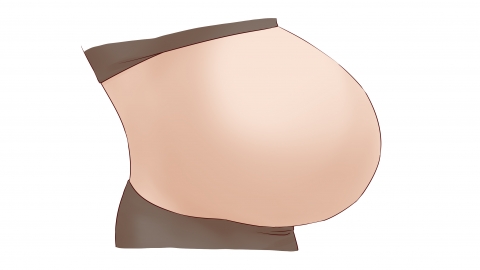What causes leg cramps in the late stages of pregnancy?
Generally, leg cramps in the late stages of pregnancy may be caused by factors such as uterine compression of blood vessels, cold exposure, calcium deficiency, lower limb varicose veins, or lumbar disc herniation. If discomfort occurs, timely medical consultation is recommended. Detailed explanations are as follows:
1. Uterine Compression of Blood Vessels
In the late stages of pregnancy, the significantly enlarged uterus may compress lower limb blood vessels, affecting blood circulation and causing insufficient blood supply to the calf muscles, which can easily lead to cramps. Symptoms may worsen after prolonged standing or sitting. It is important to avoid maintaining the same posture for extended periods. After standing or sitting for a while, appropriately move the calves, such as by standing on tiptoes or walking, to promote blood circulation. When resting, elevate the calves to reduce vascular compression. Choose loose and comfortable clothing and shoes to avoid tight garments restricting the lower limbs.
2. Cold Exposure
In the late stages of pregnancy, the body is highly sensitive to changes in ambient temperature. If the calves are exposed to cold, it may stimulate muscle contractions, causing cramps, especially during sleep when inadequate warmth increases the likelihood. Keep the calves warm during sleep by wearing loose trousers or covering with a light blanket. Avoid direct exposure of the calves to air conditioners or fans. Before bedtime, soaking feet in warm water for 10-15 minutes can promote blood circulation in the calves and relieve muscle tension.

3. Calcium Deficiency
In the late stages of pregnancy, the growing fetus requires large amounts of calcium. If the pregnant woman lacks sufficient calcium intake, her blood calcium levels may drop, increasing calf muscle excitability and causing cramps, which may be accompanied by symptoms such as leg weakness. Incorporate more calcium-rich foods into the daily diet, such as milk, soy products, and dark green vegetables. If necessary, calcium supplements may be taken under medical guidance, such as calcium carbonate D3 tablets, calcium gluconate tablets, or calcium lactate granules. Additionally, moderate sun exposure for 15-20 minutes daily during outdoor activities can help promote calcium absorption.
4. Lower Limb Varicose Veins
Hormonal changes and uterine compression in late pregnancy can impede venous blood return in the lower limbs, potentially leading to varicose veins. Blood stasis in the veins can cause calf muscle hypoxia, triggering cramps, which may be accompanied by symptoms such as leg heaviness and visible bulging veins. Avoid prolonged standing or walking, and elevate the calves when resting. Medical compression stockings may be worn under medical guidance to reduce venous pressure. Regular calf muscle exercises, such as ankle flexing and leg stretching, can strengthen muscles and promote venous return.
5. Lumbar Disc Herniation
In the late stages of pregnancy, increased lumbar load may trigger or worsen lumbar disc herniation. The protruding disc may compress nerves, causing radiating cramps in the calf muscles, which may be accompanied by symptoms such as lower back pain and leg numbness. Avoid excessive lumbar strain and reduce bending movements; squat down before picking up objects. Choose a mattress with appropriate firmness when resting to maintain the natural lumbar curvature. Under medical guidance, medications such as vitamin B1 tablets, mecobalamin tablets, and calcium gluconate tablets may be used to alleviate symptoms, strictly following medical instructions. If symptoms are severe, targeted treatment should be administered after medical evaluation.
In daily life, maintain a balanced diet to ensure adequate intake of calcium, vitamins, and other nutrients. Engage in moderate, gentle exercises such as prenatal yoga or walking to enhance physical fitness.





